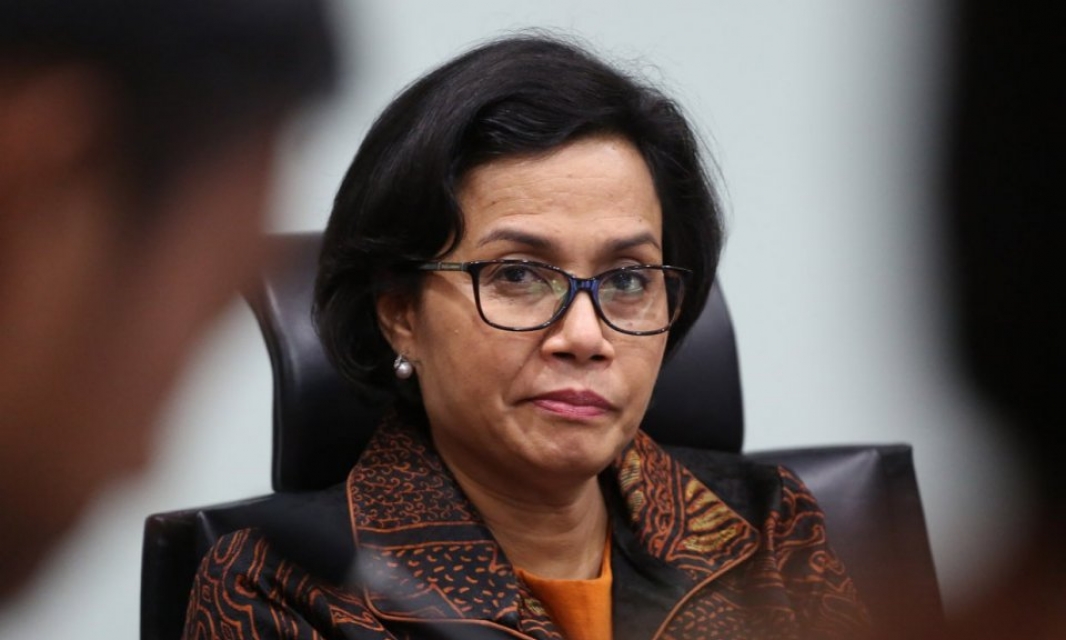 Indonesia's Minister of Finance, Sri Mulyani Indrawati, remained silent when being asked about the hike of BPJS premium. (Image via Katadata)
Indonesia's Minister of Finance, Sri Mulyani Indrawati, remained silent when being asked about the hike of BPJS premium. (Image via Katadata)
Asked about the hike in BPJS premium, Finance Minister clams up
As stipulated in Presidential Regulation (Perpres) No. 75 of 2019 regarding the amendment to Perpres No. 82 of 2018 regarding Health Insurance, the Indonesian government doubles the premium of Healthcare and Social Security Agency (BPJS Kesehatan) for non-wage recipients (PBPU) and non-worker. The President of Indonesia, Joko Widodo, generally known as Jokowi, signed the Perpres on 24 October.For the first-class facility, the monthly premium is raised to Rp160,000 from previously Rp81,000, the second-class is Rp110,000 from Rp51,000, and the third-class is Rp42,000 from Rp25,500.
When being asked for any comment about the new regulation effective starting next year, Indonesia’s Minister of Finance, Sri Mulyani Indrawati, refused to drop a single word about the regulation that raises the premium by 100%.
The Finance Minister was attending the 73rd Oeang Republik Indonesia (ORI) Day celebration. Sri gave comments regarding the celebration. However, when the question about BPJS premium hike popped out, she clammed up. The reporters kept asking the Finance Minister whether the government had thought about the regulations thoroughly despite controversies it reaped among the Indonesian people.
The Coordinating Minister for Human Development and Cultural Affairs, Puan Maharani, hoped that by the raise of BPJS premium and management improvement, the BPJS deficit could be overcome.
However, the Indonesian workers could not take it. Initially, the Indonesian workers demanded the hike be limited to 25% for each independent worker for each class. The reason was that the provincial minimum wage (UMPs) for some provinces are still considered low.
For example, Central Java’s UMP is Rp1.6 million. With the new regulations, the Indonesian workers complained that it will take almost 50% of their wages just to pay the premium, and the remaining is not sufficient for their daily needs.
Regardless, the Indonesian government still went on with the new regulations.
Source: https://bit.ly/2BWypsS
 English
English Japan
Japan

pink pill drug sildenafil citrate tablets 100 mg pfizer viagra without a doctor prescription viagra para mujer sildenafil citrate 100mg prices generic viagra availability
zithromax dosage azithromycin 1 g how much does azithromycin cost azithromycin chlamydia how long
amoxil impetigo amoxicillin 500 mg dosage what class of drug is amoxil puedo mezclar ibuprofeno con amoxil
prophylactic plaquenil plaquenil 250 does plaquenil reduce pain in osteoarthritis what is the normal prescribing dose of plaquenil for mixed connective tissue disorder?
neurontin detox gabapentin pill 100mg neurontin 600 mg ne ilac?± how much gabapentin to take to get high
viagra vs sildenafil citrate best male supplements for libido viagra otc brand name cialis red male enhancement pills are there substitutes for viagra kroger drug prices list compra viagra walmart pharmacy prices for viagra is sildenafil citrate safe walmart pharmacy 4 dollar list viagra on line new treatments for impotence viagra trial pack libido help for women how much cialis is too much viagra cock average age for viagra tadacip dosage walmart cash price for prescriptions cialis viagra list of ed medications top 50 generic drug manufacturers natural viagra foods best male performance supplement 40 mg cialis dosage viagra fast delivery usa cheap viagra flomax erectile dysfunction treatment cost of cialis vs viagra symbicort samples for physicians strongest viagra pill viagra professional 100mg ebay
neurontin trigeminal neuralgia should you drink on neurontin? how long does it take for gabapentin 300 mg to work
modafinil provigil does provigil cause blood thinning how long does provigil stay in your body
albuterol treatment ventolin over the counter albuterol sulfate inhalation solution for sale what does ventolin hfa do
buy neurontin 2400 mg gabapentin neurontin used for nerve pain why is gabapentin a controlled substance
ivomec vs ivermectin can i give my cat ivermectin ivermectin how does it work
purchasing viagra over the internet is generic viagra effective viagra para mujeres homemade viagra drink amazon online shopping mobile
modafinil for anxiety buy modafinil usa what does provigil do to you how much is a prescription for modafinil
alternative to lasix order lasix online where can i buy furosemide tablets how does furosemide work in the body?
azithromycin contraindications zithromax price india buy zithromax over the counter what is azithromycin 250
azithromycin for dogs zithromax australia can i drink while taking azithromycin chlamydia treatment azithromycin how long
advil samples for healthcare professionals cost of viagra and cialis sildenafil citrate 100mg india viagra ohne rezept natural remedy for low libido in women bayer samples for physicians
amoxicillin and prednisone purchase amoxicillin 250mg online primary physiological effects via diuresis amoxil is amoxil cave good for sinus infection
viagra for women pink pill warnings for cialis sildenafil citrate tablets 200 mg strongest viagra pill viagra dosing options generic drugs india